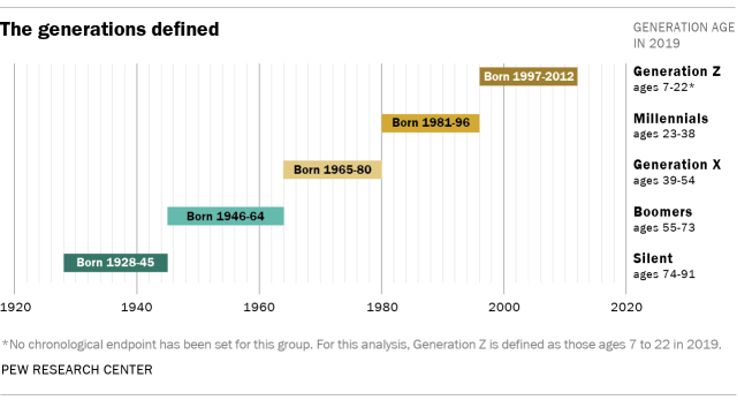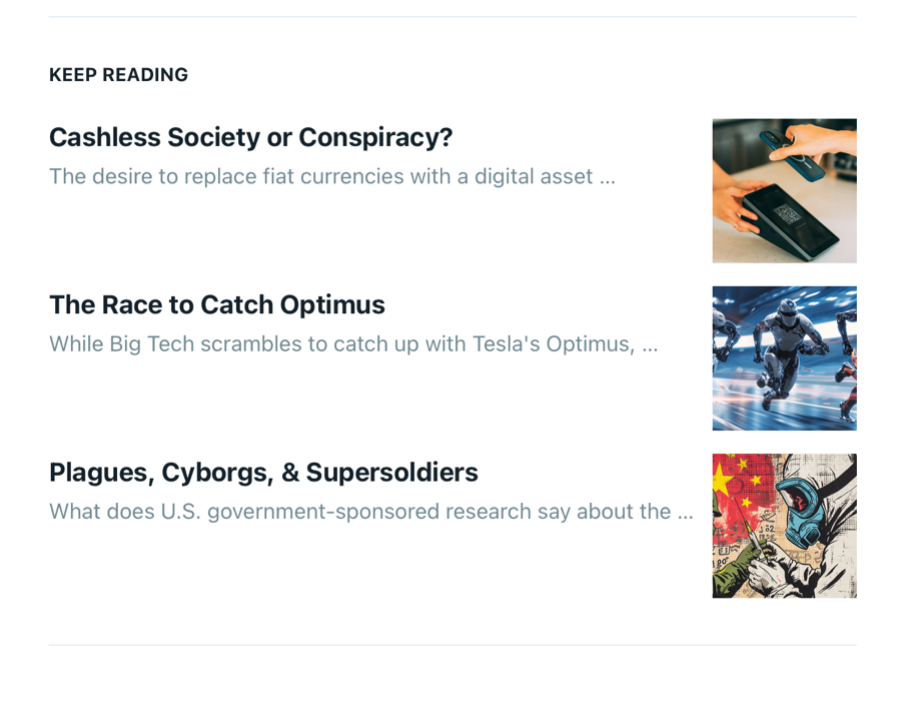
I’ve been thinking a lot about the impact of technology on society lately.
It’s hard not to… considering the vast implications of artificial intelligence (AI).
Over the last year and a half, it has felt like measuring a moving goalpost, considering the acceleration that we’re all seeing unfold in real-time.
Understanding the impact of technology to a consumer, or to a business, has always been a critical part of my research process.
Having sold billions of dollars of technology around the world during my time as a high-tech corporate executive over the years, understanding what features of a product or service will motivate a customer to buy is the most important part of business development.
Just like a corporation, products or services that provide great utility are the ones that tend to gain the widest adoption.
And each generation of the past has had its technological breakthroughs, which directly influenced that generation’s culture.
Influence…
What could possibly be said of the technological breakthroughs of today…
And the ways they will influence tomorrow’s generations?
The Boomers, those born between 1946-1964, almost entirely missed technology in the workplace.
Some would argue that they lucked out. Mobile phones and e-mail were mostly absent in the office, and meetings were either in person or a person-to-person call.
There was no working around the clock. And when you got home, there was no e-mail to worry about.
Gen X were the first to begin their careers with e-mail, computers, and mobile phones. It completely changed the dynamics of both the workplace and life.
Productivity improved and quality of life decreased, as the lines blurred quickly between work and life.
And Millennials were the first generation to be online from the start. Thanks to web browsers, the internet was immediately a resource from childhood.
Gen Z, born between 1997-2012, has been sadly consumed and influenced by social media. So much so, that it has negatively impacted their interpersonal skills and ability to resolve conflict in a healthy manner.
While there are certainly benefits to social media platforms, it is a great example of how technology can be overused, resulting in very measurable societal problems.
And as we learned over the last few years, social media platforms actively and systematically colluded with government agencies to push political narratives, influence the outcomes of elections, and propagate false information.
Gen Z is also the first generation to basically have everything they need at their fingertips on their phones. Music, TV, video, YouTube, games, and services at the press of a button.
Hungry? Uber Eats or Door Dash. Need a ride? Lyft or Uber. Need to go shopping? Why waste time at a store, just press a button and it will be delivered to your door in a day or two.
Instant gratification and dopamine have fueled a disassociation between the work required to get things done and the value of hard-earned money.

While we’ve all been lied to and manipulated, I feel particularly bad for the Gen Z cohort.
Having grown-up with social media, and largely relying on it for information, most have not developed the ability to discern what’s real and what’s spin, making them particularly susceptible to outside influence…
Which is why I’ve been thinking about Generation Alpha — or what I think of as Gen “AI”pha (eye-pha).
Born roughly from 2010 on, Gen AIpha is the first generation that will grow up with AI at their fingertips.
And just to be clear, I’m not referring to the generative AI platforms that so many of are enjoying today, like OpenAI’s ChatGPT or text-to-image technology like Midjourney.
Yes, generative AI is now being used extensively by young students today. It is remarkably useful.
ChatGPT can answer just about anything — in seconds — and provide a focused and accurate answer.
Can we really convince a 15-year-old to read three books — when they can find the information they need in 3 seconds — to complete their homework for the week?
The starting point for most students is quickly becoming AI. The task has become taking that information, understanding it, and then contextualizing in their own words.
There is even an incredible AI tutor company that has been making waves in education — Synthesis. It was founded just a few years ago, and it really started to take off last year.
The founder of Synthesis originally worked with Elon Musk to build a curriculum for an extremely small private school that radically changed the approach to education for Musk’s children and a few others.
That work was the foundation for Synthesis, which is now focused on teaching math and critical thinking, skills the world needs a lot more of now.
But the most important element is that it is driven by AI, which means it is scalable to reach every child on the planet that has access to a computer or a tablet. Utilization will drive down costs, and subject matters taught will expand quickly to other topics.
I have to be honest, I’m a bit jealous. When I think back to my years as a student, I wasted so much time searching for the right information and sources. Hours and hours of effort every week that provided no educational value — I just needed to grind through it to find what I needed.
Now that process takes seconds. No wasted time. What’s not to like?
And AI tutors will soon have the ability to adapt to each individual student. The optimal way for one student to learn can be different than that of another. AI has the ability to optimize for individual students for no extra cost.
And where things will really “pop” for Gen AIpha is with AI agents, which we will begin to see later this year.
We can think of these AI agents as the “doers,” like us Gen X’ers are so well known for.
They are bits of AI software designed to perform complex tasks — the kinds of tasks that we’ve all had to do by hand.
For example, if we want a trip to Taos, New Mexico for 3 nights in a four-star hotel with a fantastic view and easy access to skiing, an AI travel agent will be able to reason, plan out the entire trip, and — with approval — book and pay for everything.
It’s the ultimate in disintermediation. Tell it what you want, and it presents a plan to you in seconds. Modify it, and say “BOOK IT.” It will be that easy.
AI agents will be able to build spreadsheets for us, book reservations, go shopping for us, take meeting notes, schedule meetings, appointments, dates, you name it. All requiring only a few seconds of our time.
These personalized digital assistants will even have a “memory” and learn our preferences, our past, and have the ability to proactively suggest and influence our future.
It doesn’t take much imagination to understand the impact of this technology on Gen AIpha.
Those of us who grew up without it will deeply appreciate it… because we will have directly experienced how much effort was required “the old way.”
Those that are born with it at their fingertips will think it’s the only way things are done. Why would anyone bother with anything else?
AI agents will deliver the dopamine and instant gratification of social media on steroids. There will be no going back.
Productivity will skyrocket as a result. That’s the great news…
Many hours a week will be freed up for other tasks, whether they are business related or personal. That’s a good thing.
But there will be widespread abuse of the technology as well
After all, with the release of the Twitter Files, we learned of how pervasive the Censorship Industrial Complex has become.
With the exception of X (formerly Twitter), all of the major internet and social media platforms are still engaging in information manipulation, shadow banning, and outright censorship.
You probably won’t believe me when I tell you that if you use Google’s Gmail, Yahoo Mail, Outlook, or Hotmail, some of my issues of Outer Limits are probably being intentionally sent into your SPAM folder.
These companies scan emails before they are delivered. And if they don’t “like” the contents of the email, or they deem them “unsafe” content, they’ll just send them to your SPAM folder. I’m not kidding.
That’s why at the bottom of every issue of Outer Limits, we show you the last three issues. That’s to make it easy to click and catch up, just in case you missed it. Rather, just in case the issue was dumped into SPAM by one of the above mentioned email services.
(You can send a strong signal to your email provider that you want to receive Brownridge emails by whitelisting us, which we explain how to do right here.)

All of this means that companies like Google (with their recently released Gemini generative AI), Meta, Microsoft (which is based on OpenAI technology), and others will employ the same manipulative techniques with their AI agents.
They will be used to push “their” narrative and manipulate — or influence — how users think.
This is dangerous. Scary. And a threat to human happiness and freedom.
Knowing who or which entity trained an AI will be just as important as what the technology does.
It will be critical to understand the dataset that an AI was trained on, as well as any programming the AI has “suffered” to push narratives or false information.
Who is informing the AI? And with what agenda?
And an even more important question comes to mind…
Who will be the watchdogs?
What are the ways you can perceive AI influencing future generations? Let us know right here.
We welcome all feedback and address the most common questions and threads in the Friday AMAs.